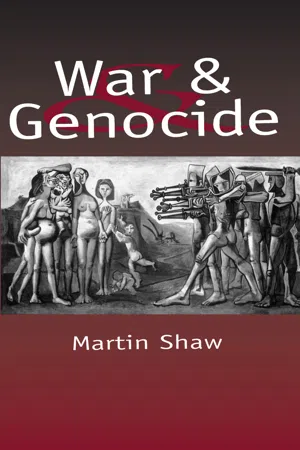
- English
- ePUB (mobile friendly)
- Available on iOS & Android
About this book
Most accounts of war and genocide treat them as separate phenomena. This book thoroughly examines the links between these two most inhuman of human activities. It shows that the generally legitimate business of war and the monstrous crime of genocide are closely related. This is not just because genocide usually occurs in the midst of war, but because genocide is a form of war directed against civilian populations. The book shows how fine the line has been, in modern history, between 'degenerate war' involving the mass destruction of civilian populations, and 'genocide', the deliberate destruction of civilian groups as such.
Written by one of the foremost sociological writers on war, War and Genocide has four main features:
- an original argument about the meaning and causes of mass killing in the modern world;
- a guide to the main intellectual resources – military, political and social theories – necessary to understand war and genocide;
- summaries of the main historical episodes of slaughter, from the trenches of the First World War to the Nazi Holocaust and the killing fields of Cambodia, Bosnia and Rwanda;
- practical guides to further reading, courses and websites.
This book examines war and genocide together with their opposites, peace and justice. It looks at them from the standpoint of victims as well as perpetrators. It is an important book for anyone wanting to understand – and overcome – the continuing salience of destructive forces in modern society.
Frequently asked questions
- Essential is ideal for learners and professionals who enjoy exploring a wide range of subjects. Access the Essential Library with 800,000+ trusted titles and best-sellers across business, personal growth, and the humanities. Includes unlimited reading time and Standard Read Aloud voice.
- Complete: Perfect for advanced learners and researchers needing full, unrestricted access. Unlock 1.4M+ books across hundreds of subjects, including academic and specialized titles. The Complete Plan also includes advanced features like Premium Read Aloud and Research Assistant.
Please note we cannot support devices running on iOS 13 and Android 7 or earlier. Learn more about using the app.
Information
Table of contents
- Cover
- Contents
- Title Page
- Copyright
- Boxes
- Acknowledgements
- Introduction
- Episode 0: The trenches
- Episode I: The Armenian genocide
- Episode II: Stalinism’s mass murders
- Episode III: Nazism, war and the Holocaust
- Episode IV: Japan’s genocidal wars
- Episode V: Allied bombing in 1939–45
- Episode VI: Nuclear war preparation
- Episode VII: The Cambodian genocide
- Episode VIII: Genocidal war in Yugoslavia
- Episode IX: War and genocide in Rwanda
- Episode X: The new Western way of war
- Index